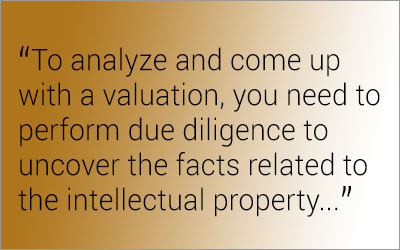20 questions to ask when performing due diligence for an intellectual property valuation
Intellectual property litigation has received remarkable attention lately. Headlines and the notion of billion-dollar damage awards have captured the imagination of patent owners and potential defendants alike. Making up almost 80% of the total market capitalization of the S&P 500, intellectual property and intangible assets can also be an important component of private-company value and a big part of an individual’s wealth, particularly for authors and artists.
To analyze and come up with a valuation, you need to perform due diligence to uncover the facts related to the intellectual property. In BVR’s Intellectual Property Valuation Case Law Compendium, expert Thomas Wolfrum (Wolfrum Family Law) suggests asking the following questions. Although the context of these questions were originally for a divorce engagement, many of these questions apply to other engagements where intellectual property (IP) is involved.
20 questions to ask:
- Who owns the IP?
Find out whether the owner is an individual or entity.
- If an entity, who controls the rights?
The entity itself may not control the rights—they could have been assigned to a third party.
- If the spouse owns the IP, does the spouse own 100%?
You need to know whether you’re valuing a partial interest.
- Are there restrictions on the noncreating spouse’s (or third party’s) involvement in the IP?
If the noncreating spouse has any control over the IP, it could affect value.
- Are rights assignable by the owner? You need to know whether they've been assigned and who all the parties are who have any rights.
- Has the IP been published, patented, or registered?
IP without protection can be vulnerable, so this adds an element of risk.
- Are royalties being paid?
If little or no royalties are being paid, maybe it’s not a valuable property.
- If royalties are being paid, what are the terms of the deal?
Get a copy of the contract.
- Are post-separation/post-divorce efforts required to continue the revenue stream? For example, personal appearances, seminars, and so on may need to be done to keep the money flowing. These efforts may not continue in the wake of an acrimonious split-up.
- Has there been a lump-sum advanced payment, requiring additional work on the part of the author/artist?
Maybe the work doesn’t pan out, so the creator or contractor (publisher or producer) may abandon the project.

- Is the future income stream fixed or variable?
A variable income stream is riskier because it depends on certain variables.
- What development costs are needed to optimize revenue?
The parties may not be willing to foot the bill for these costs.
- When do rights end?
Rights don’t last forever, and the duration depends on the nature of the property.
- If a patent, is there a risk of the patent being declared invalid?
Maybe the creator infringed on another patent.
- Have all of the marketing efforts necessary to maximize revenues been completed, started, or planned?
If not, find out who will carry these activities out—and whether they will happen at all.
- Has the owner issued any licenses (reproduce, distribute)?
If yes, find out the terms and duration of the licenses.
- Are there other licenses that could be obtained to generate revenue?
The potential for additional licensing opportunities will affect potential income streams.
- Are there derivative works?
A derivative work is a separate work that stems from the original, such as a movie made from a book.
- May existing rights be divided (in kind) without infringing on the interest?
The ability to split up an interest can facilitate equitable distribution of marital property.
- What are the name(s) of person(s) who track/report revenues and expenses? Anybody involved in this will have access to records and documentation.
Only after due diligence is done can an analysis be made of what the intellectual property is worth. When the analysis is completed, Wolfrum advises that you step back and see whether the analysis is reasonable in an overall sense. If it is, a formal opinion of value can then be developed.
For more on intellectual property valuation, download an excerpt of BVR’s Intellectual Property Valuation Case Law Compendium. This must-have reference provides a concise overview of important topics for expert witnesses that testify on intellectual property matters, plus nearly 200 court case digests on intellectual property valuation in litigation.

